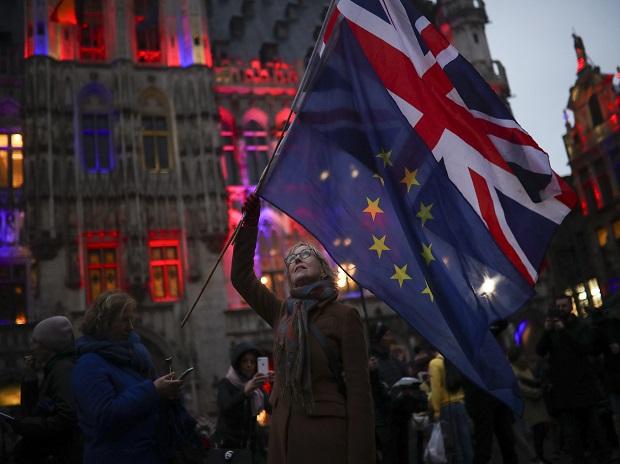UK, EU seek to avert ‘sausage war’ in post-Brexit trade talks in Ireland

A senior European Union official expressed frustration Wednesday after talks with the UK broke up without resolving differences over the implementation of their post-Brexit trade deal in Northern Ireland.
Maros Sefcovic, the EU’s chief negotiator in the talks, said the bloc had reached a crossroads” in its relationship with the U.K. after the British government threatened to take further unilateral action to delay living up to its obligations under the Brexit agreement.
Trust, which should be at the heart of every partnership, needs to be restored,” Sefcovic told reporters after the talks.
That is the EU approach and the EU preference. If the U.K. were to take further unilateral action over the coming weeks, the EU will not be shy in reacting swiftly, firmly and resolutely to ensure that the U.K. abides by its international law obligations.
Sefcovic met with his British counterpart, David Frost, amid rising tensions over provisions of the Brexit deal known as the Northern Ireland Protocol, which effectively created a regulatory border between Northern Ireland and the rest of the U.K. The EU earlier this year threatened to take legal action against Britain when it delayed implementing some parts of the accord. The British government is now considering further unilateral action as new deadlines approach.
Frost called for pragmatic solutions” to bridging the divide.
What the EU is insisting on is we should operate the protocol in an extremely purist way,” Frost said separately. The reality is that it’s a very balanced document that’s designed to support the peace process and deal with the very sensitive politics in Northern Ireland.
While the Northern Ireland Protocol was designed to protect the peace process in the region, many pro-British residents are angry because of the regulatory border between Northern Ireland and the rest of the U.K. Newly required border checks have also caused shortages of some products.
Britain is calling for compromise, but the EU says the new rules are needed to protect the bloc’s single market. Both sides fear the tensions could fuel a return to violence in Northern Ireland.
The U.K. insists it wants to avoid a trade war with the EU, and says no decision has been taken on whether it will unilaterally extend the grace period for chilled meats due to end on June 30. Sefcovic said that would spark stern retaliatory action.
The 1998 Good Friday Agreement, which brought peace to Northern Ireland, was underpinned by the fact that both the U.K. and the Republic of Ireland were members of the EU. That made it possible for trade to flow freely between Ireland and Northern Ireland, stimulating economic growth and creating jobs on both sides of the border.
In an effort to keep the border open, the EU and the U.K. agreed that Northern Ireland would remain part of the European single market after Brexit. But that means EU rules on issues such as food safety still apply in Northern Ireland, meaning there have to be checks on some goods shipped into Northern Ireland from other parts of the U.K.
The divorce deal, which took effect Jan. 1, included a number of grace periods that gave Britain time to put in place new systems for checking items coming into Northern Ireland to ensure they complied with EU rules. Those grace periods are now ending, causing headaches in Northern Ireland.
Now, the two sides are sparring over the rules governing chilled meats, raising the specter of what British newspapers are calling a sausage war. British officials are considering extending the grace period covering chilled meets to prevent the EU from blocking shipments of products such as sausages and ground beef on July 1.
Sefcovic described the Northern Ireland Protocol as an opportunity that will give the region access to more than 500 million customers in both the U.K. and the European Union.
But Frost said compromise is needed to make that a reality. The U.K. sent 10 papers to the EU offering solutions to many of the issues that divide the two sides, but received no written responses from the bloc, he said.
(Only the headline and picture of this report may have been reworked by the Business Standard staff; the rest of the content is auto-generated from a syndicated feed.)
 Dear Reader,
Dear Reader,
Business Standard has always strived hard to provide up-to-date information and commentary on developments that are of interest to you and have wider political and economic implications for the country and the world. Your encouragement and constant feedback on how to improve our offering have only made our resolve and commitment to these ideals stronger. Even during these difficult times arising out of Covid-19, we continue to remain committed to keeping you informed and updated with credible news, authoritative views and incisive commentary on topical issues of relevance.
We, however, have a request.
As we battle the economic impact of the pandemic, we need your support even more, so that we can continue to offer you more quality content. Our subscription model has seen an encouraging response from many of you, who have subscribed to our online content. More subscription to our online content can only help us achieve the goals of offering you even better and more relevant content. We believe in free, fair and credible journalism. Your support through more subscriptions can help us practise the journalism to which we are committed.
Support quality journalism and subscribe to Business Standard.
Digital Editor
business-standard.com

